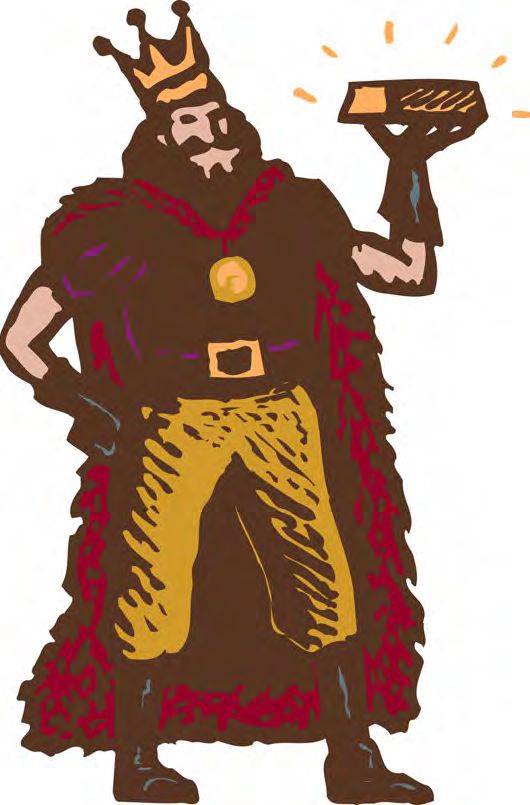by Stephen Pearson, age 16

“We were both dumb.” Midas, the gold-stricken king of Ovid’s Metamorphoses parades this astute observation to Ilsebill, a lesser-known but rather arrogant protagonist of the stories of the Brothers Grimm who once became entangled in a fateful encounter with a certain magic fish.
“I was not dumb—I was entitled to all the power and prestige I had! It was that darned fish!” retorts Ilsebill indignantly.
Thus might a hypothetical exchange run between the protagonists of two stories concerning greed after the withdrawal of their gifts. The authors of these two fables, the poet Ovid and the Brothers Grimm, had similar ideas concerning greed and its solution although they were separated by both time and distance. Ovid, a Roman poet who lived in the era of Christ, Augustus Caesar, Mark Antony, Tiberius, and other such memorable personages certainly had no contact with the Brothers Grimm, who lived in Germany in the eighteenth and nineteenth centuries. Nevertheless, Ovid’s story “King Midas and the Golden Touch” and the tale of the Brothers Grimm “The Fisherman and His Wife” from their Children’s and Household Tales, though differing in their conclusions, agree on one fundamental precept which readers can observe throughout the stories’ twists and turns of plot: greed is evil. Thus, these stories instill a realization, especially in children, that the onset and desire of greed always result in disastrous consequences and that the remedy for that greed involves a withdrawal of any material benefit obtained from it.
Concerning the onset of greed, in one story, a gift is given, and in the other, a gift is asked for, signifying the fundamental difference in the character of these protagonists although they are both initially pleased with their gift. When Ilsebill discovers that Henry has freed a magic fish, she immediately snatches the chance to better her life and commands that her husband “tell the fish [that they] want a snug little cottage.” The fish grants this request, reasonable albeit rudely expressed, and Ilsebill is for the moment satisfied. However, greed and the thrill of having a magic fish to ask things of discreetly poisons Ilsebill’s mind at this point, and she “curtly” states that they will only “try” to “live pleasantly” in the cottage. Midas is different. Lurking in the depths of his character, a greed for gold and a rash, bold nature combine to produce his problems. Kindly he shelters and entertains the god Bacchus’s old teacher, Silenus, which shows that Midas has at least a smidge of self-giving in his character, and on account of that, Bacchus grants Midas a wish, as opposed to Ilsebill, who demands one. Simultaneously, Midas’s greed and impetuosity rear their ugly heads at this moment, and he impulsively requests the power to turn everything he comes into contact with into gold. While it is true that both are originally satisfied, Ilsebill brings her greed upon herself through demanding a wish, while Midas’s ingrained greed forces his precipitate nature to ask of the gift-giving god Bacchus a gift of doom, which indicates that Ilsebill is a more malicious character than Midas.
Because she is more malicious than Midas, Ilsebill’s effects are in turn more detrimental than his: the effects brought about by Ilsebill’s greed result in an impatient insatiability, while Midas realizes that he made a doltish decision. Greed seizes Ilsebill’s being when she beholds that her first wish has come true, and each subsequent demand she makes is loftier, building upon itself to construct the monster that she is. Bursting audaciously through the boundaries of all decent human respect and changing from wishing for prosperity to wishing for power, that greed warps Ilsebill’s mind into believing that not only material things but honor is due to her, as shown in her assertion that she “must be king of all the land.” She never stops. Ceaselessly unsatisfied, increasingly desensitized, and excessively demanding, Ilsebill flouts all code of civility, thus setting herself up for disaster. When Midas, by contrast, finds out that his wish has come true, he is thrilled, and it does not even cross his mind to demand for more gifts. During his gleeful rapture while testing his new power, the protagonist of Ovid’s account does not realize that his gift will be his doom, which shows his more innocent and unthinking nature. Nonetheless, when he gleans from the day’s events that his boon will bring death, he shows a newfound humility and “crie[s] out to [Bacchus]” to revoke the gift—not even thinking about requesting a modified version of his power. With Ilsebill, greed results in baleful consequences, insolence, and a rapidly multiplying voraciousness, but with Midas, greed results in a life-threatening situation in which he finds the humility to apologize and beg for a solution.
In both cases, the solution, whether begged for or not, is for the gift to be rescinded, but while Ilsebill’s gift is forcibly taken away on account of her arrogance, Midas’s gift is withdrawn on account of his own repentance. Ilsebill’s greed grows like bacteria in a tropical petri dish due to her increasing notion that she deserves everything, pushing narcissism to the extreme when she entitles herself to being king, emperor, pope, and, ultimately, lord of sun and moon. Only one course remains. After Henry wretchedly makes his last request on behalf of his wife, the fish, after rising from an increasingly dark and unbridled sea which mirrors Ilsebill’s greed, perceives that there will be no end to her thirst for dominion and wealth unless her gifts are revoked, and he deprives her of any benefits she has obtained from him, telling her to “go home to [her] pigsty.” Unfortunately, Ilsebill learns nothing and exhibits no sign of repentance—she probably blames her poor husband, Henry. A striking difference displays itself in the character of Midas, who recognizes his folly of his own accord and regards the rescinding of his “ruinous power” as an act of mercy to result in his ultimate contentment. Noticing Midas’s humility, Bacchus neither deprives Midas of everything he has nor disgraces him, and Midas finishes the story as “a humbled and wiser man.” Even so, his greed is not wholly without consequence: every once in a while, the residue of his golden touch extracts the moisture out of the fields near the River Pactolus, showing that greed is never without permanent aftermath. In both stories, greed is solved by withdrawal, but in Ilsebill’s case, her glory and power are wrenched to the ground by force due to her haughtiness, while Midas apologizes and entreats the god Bacchus to withdraw the gift.
Midas is right. They are both “dumb.” But only he learns that. With both protagonists, greed is a obscured ogre that overruns them without them realizing it. However, Midas is more impetuous than he is evil, wounded by an ingrained greed that he probably does not identify until the end, while Ilsebill, once greed has seized her, does not fear bulldozing over politeness, decency, and even other human beings to get her way. Most importantly, readers, especially children, will realize this and understand that greed will either be alleviated by repenting of it and losing what benefits came of it or it will ruin the person it has enslaved, driving him to disgrace and downfall. When they realize this, they will compare themselves to the two protagonists. Are they better than them? If they are not, then they will strive to overcome their avarice to distance themselves as far away as they can from the two protagonists before it is too late. If they are, they will be justified in their own sight of their pursuit of virtue, persevering along the path of righteousness. Through these two apparently basic fairy stories, the readers will learn to control their greed, lest they be snatched down from prestige and any hope of restoration.





Add Comment